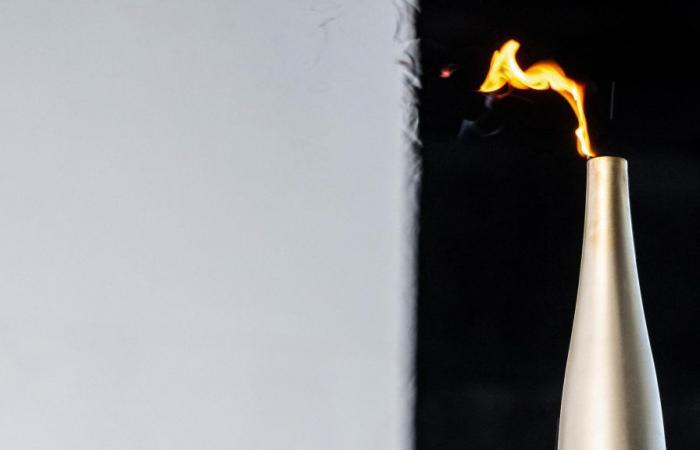LARA BALAIS / AFP
An illustrative photo of the Olympic flame upon its arrival in Pointe-a-Pitre in Guadeloupe, June 15, 2024 before the Paris 2024 Olympic Games.
HEALTH – The passage of the Olympic flame does not please everyone. While traveling from city to city the flamboyant symbol of the Paris 2024 Olympic Games often causes the event, for some it also means a deprivation of liberty. Thus, several doctors say they are worried about the health of their patients with mental illnesses, prevented from going out by the prefects during the passage of the flame.
“We have been contacted by many doctors and hospital directors: professionals from all over France have alerted us”, reported this Saturday June 29 to AFP Dominique Simonnot, general controller of places of deprivation of liberty including psychiatric services. As such, Dominique Simonnot ensures, on behalf of the State but independently of the government, that the rights of people deprived of their freedoms are respected, which includes patients hospitalized against their will.
Certainly, these restrictive measures only last a few days while the flame passes through the areas concerned, but concern is now growing regarding the period of the Games itself, much longer since it will last from July 26 to August 11 for the Olympic part and from August 28 to September 8 for the Paralympic part.
A scenario that repeats itself from city to city
In recent weeks, from Bordeaux to Nantes via Mulhouse, a scenario has been systematically repeated. At each of these stages of the Olympic flame’s journey, the prefecture has asked health establishments to postpone the discharge of patients deemed potentially dangerous.
AFP, for example, consulted a note from the Grand Est Regional Health Agency (ARS) – relayed in particular by the Latest News from Alsace and the Chained duck -, which here serves as a transmission belt between the prefecture and health establishments.
“Due to the passage of the Olympic flame in Haut-Rhin on June 26, special attention measures are expected concerning individuals suffering from psychiatric disorders”said this note, specifying that it had been written “at the request of the prefecture”.
For two days, it was explicitly requested that “postponement of unaccompanied (and) accompanied outings” except certain medical appointments. “Why are we preventing them from leaving when the flame passes? It’s quite tragic when we praise the Paralympic Games with the inclusion of disabled people”regrets Dominique Simonnot who sent a letter to the Ministry of the Interior.
Cutting back on patient freedoms in the name of safety
These measures come in a context where the authorities are implementing a major security system in preparation for the Olympic Games. In addition, several tragedies have recently drawn attention to the monitoring of potentially dangerous patients. At the end of 2023, the Minister of the Interior, Gérald Darmanin, had thus pointed out a “psychiatric failure” after a fatal knife attack near the Eiffel Tower.
The authorities have assured that no national instructions have been given regarding restrictions related to the passage of the flame or during the Olympic period.
For many doctors, it is in any case a contradiction in terms to curtail patients’ freedoms, even in the name of public safety. “This is a trend that must be denounced”estimates to the AFP the psychiatrist Frank Bellivier, himself delegate for psychiatry at the Ministry of Health. “This is unacceptable because it automatically equates the mentally ill with someone who is dangerous.”
Because he emphasizes, it is the psychiatrist who is competent to determine whether a patient is too dangerous to leave. However, what shocks doctors and relatives in this case is that the prefectural instructions apply a priori and without distinction.
“We are in a logic of precautionary principle: it is maximum stigmatization, which marks with a hot iron people suffering from mental disorders”, regrets to AFP Marie-Jeanne Richard, president of Unafam, an association which brings together relatives of mentally ill people. Like many psychiatrists, she emphasizes the deleterious nature of such deprivations of liberty for the recovery of the patients concerned.
Also see on Le HuffPost :
Reading this content may result in cookies being placed by the third-party operator who hosts it. Taking into account the choices you have expressed regarding the deposit of cookies, we have blocked the display of this content. If you wish to access it, you must accept the “Third Party Content” category of cookies by clicking on the button below.
Play Video






